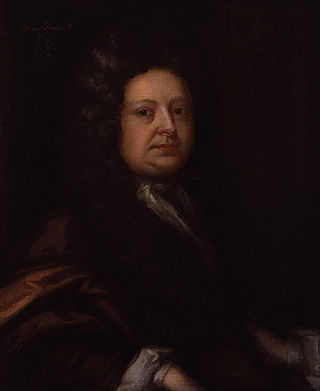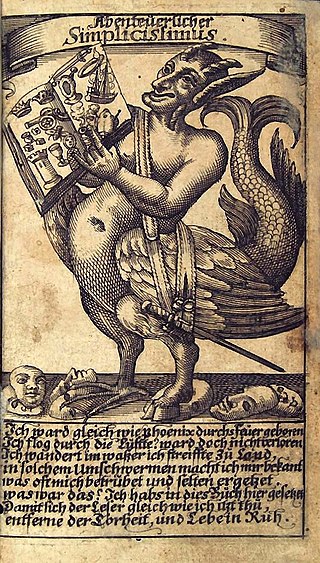Related Research Articles

1668 (MDCLXVIII) was a leap year starting on Sunday of the Gregorian calendar and a leap year starting on Wednesday of the Julian calendar, the 1668th year of the Common Era (CE) and Anno Domini (AD) designations, the 668th year of the 2nd millennium, the 68th year of the 17th century, and the 9th year of the 1660s decade. As of the start of 1668, the Gregorian calendar was 10 days ahead of the Julian calendar, which remained in localized use until 1923.

Sir William Davenant, also spelled D'Avenant, was an English poet and playwright. Along with Thomas Killigrew, Davenant was one of the rare figures in English Renaissance theatre whose career spanned both the Caroline and Restoration eras and who was active both before and after the English Civil War and during the Interregnum.
This article presents lists of the literary events and publications in 1673.

This article contains information about the literary events and publications of 1670.
This article contains information about the literary events and publications of 1669.
This article contains information about the literary events and publications of 1667.
This article presents lists of the literary events and publications in 1664.
This article contains information about the literary events and publications of 1663.

Thomas Shadwell was an English poet and playwright who was appointed Poet Laureate in 1689.

The Miser is a five-act comedy in prose by the French playwright Molière. It was first performed on September 9, 1668, in the theatre of the Palais-Royal in Paris.

Hans Jakob Christoffel von Grimmelshausen was one of the most notable German authors of the 17th century. He is best known for his 1669 picaresque novel Simplicius Simplicissimus and the accompanying Simplician Scriptures series.

Simplicissimus was a German weekly satirical magazine, founded by Albert Langen in April 1896 and headquartered in Munich. It was interrupted by a hiatus from 1944–1954, became a biweekly in 1964, and ceased publication in 1967. Simplicissimus took its name from the protagonist of Hans Jakob Christoffel von Grimmelshausen's 1668 novel Der Abenteuerliche Simplicissimus Teutsch, which is regarded as the first adventure novel in the German language and the first German novel masterpiece.

Simplicius Simplicissimus is a picaresque novel of the lower Baroque style, written in five books by German author Hans Jakob Christoffel von Grimmelshausen published in 1668, with the sequel Continuatio appearing in 1669. Inspired by the events and horrors of the Thirty Years' War which devastated Germany from 1618 to 1648, it is regarded as the first adventure novel in the German language and the first German novel masterpiece.
Sir Martin Mar-all, or The Feign'd Innocence is an English Restoration comedy, first performed on 15 August 1667. Written by John Dryden and based on a translation of L'Étourdi by Molière, it was one of Dryden's earliest comedies, and also one of the greatest theatrical successes of his career.
Events from the year 1668 in England.

The Duke's Company was a theatre company chartered by King Charles II at the start of the Restoration era, 1660. Sir William Davenant was manager of the company under the patronage of Prince James, Duke of York. During that period, theatres began to flourish again after they had been closed from the restrictions throughout the English Civil War and the Interregnum. The Duke's Company existed from 1660 to 1682, when it merged with the King's Company to form the United Company.
Baldanders or Soon-Different is a creature of Germanic literary myth that features protean properties.
Nationality words link to articles with information on the nation's poetry or literature.

Henry Harris was an English stage actor and theatre manager. Initially a painter he was a founder member of the new Duke's Company in 1660 following the Restoration which established itself at the old Salisbury Court Theatre before moving to the new Lincoln's Inn Fields Theatre shortly afterwards. Due to his background Harris may have been a set designer and painter during his early years with the company. However, by 1661 he was acting, and his first recorded role was in William Davenant's The Siege of Rhodes that summer. He quickly established himself as the second actor in the troupe after Thomas Betterton.
References
- ↑ Uglow, Jenny (2010) [2009]. A Gambling Man. London: Faber. p. 443. ISBN 978-0-571-21734-2.
- 1 2 Levi, Anthony (1992). Guide to French Literature: Beginnings to 1789. St. James Press. p. 520. ISBN 978-1-55862-159-6.
- ↑ Izaak Walton (1875). The Complete Angler: Or the Contemplative Man's Recreation, Being a Discourse of Rivers, Fish-ponds Fish and Fishing. Chatto and Windus. p. 318.
- ↑ Kate Loveman (2008). Reading Fictions, 1660-1740: Deception in English Literary and Political Culture. Ashgate Publishing, Ltd. p. 30. ISBN 978-0-7546-6237-2.
- ↑ Bordeaux bibl. municipale (1842). Catalogue des livres. p. 673.
- ↑ Grimmelshausen, H. J. Chr. (1669) [1668]. Der abentheurliche Simplicissimus [The adventurous Simplicissimus] (in German). Nuremberg: J. Fillion. OCLC 22567416.
- ↑ "The Loseley Manuscripts: Records of the More and More Molyneux Family of Loseley Park". The National Archives (United Kingdom) . Retrieved February 21, 2013.
- 1 2 "Sweden". The Encyclopedia of Science Fiction. October 8, 2013. Retrieved December 12, 2013.
- ↑ Oxford Dictionary of National Biography 7 (2002) pp. 110–111.
- ↑ Almut Spalding; Almut Marianne Grützner Spalding (2005). Elise Reimarus (1735-1805). Königshausen & Neumann. p. 518. ISBN 978-3-8260-2813-7.
- ↑ Gerrit Arie Lindeboom (1968). Herman Boerhaave: The Man and His Work. Methuen. p. 4. ISBN 978-0-416-10880-4.
- ↑ Henry Benjamin Wheatley (1891). London, Past and Present: Its History, Associations, and Traditions. John Murray. p. 112.
- ↑ Rudolf Steiner (1975). Between Death and Rebirth: Ten Lectures Given in Berlin Between 5th November, 1912 and 1st April, 1913. Rudolf Steiner Press. p. 69. ISBN 978-0-85440-287-8.
- ↑ Henry Merivale Trollope (1905). The Life of Molière. Constable. p. 108.
- ↑ Programm und Jahresbericht des K.K. Ober-Gymnasiums in Görz am Schlusse des Schuljahres 1856 (in German). J. B. Seitz. 1856. p. 7.